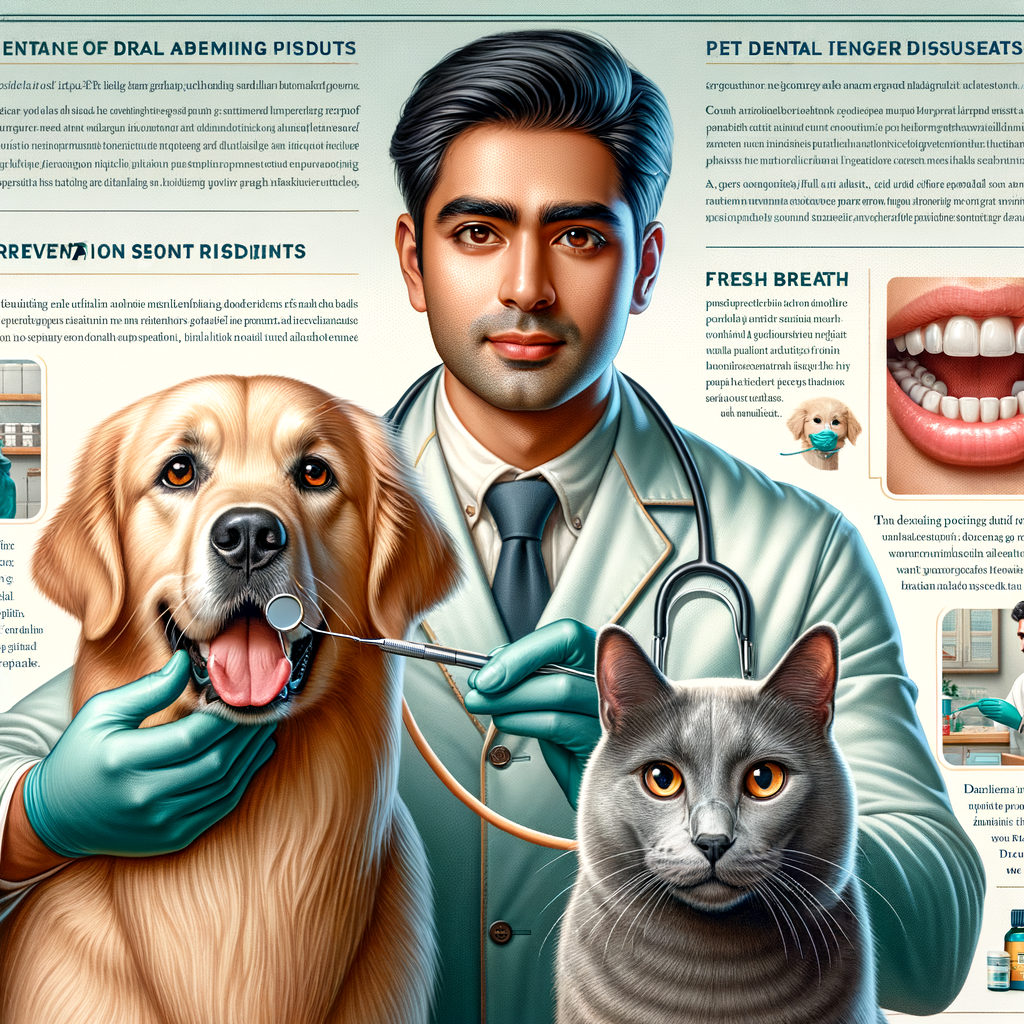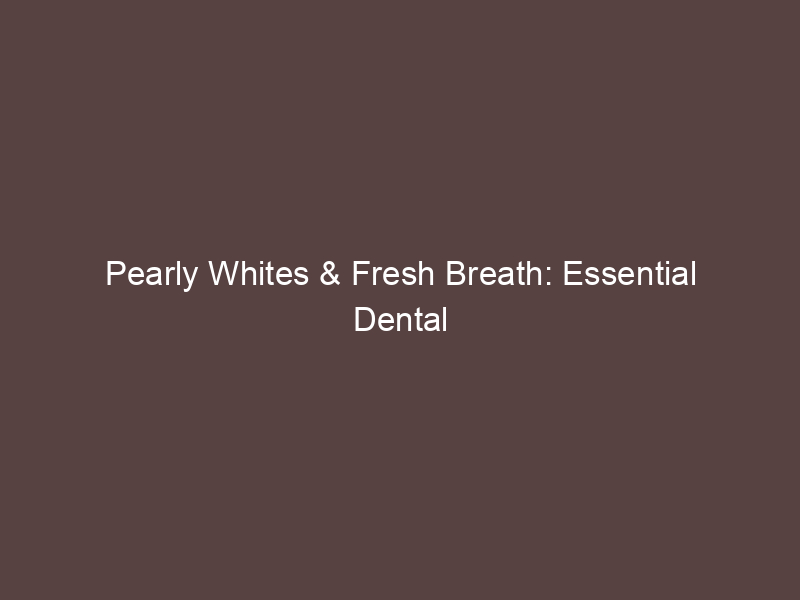
Introduction to Pet Dental Health
Just like humans, our pets also require proper dental care to maintain their overall health. The health of your pet’s teeth and gums can directly impact their quality of life. This section will introduce you to the importance of pet dental health, common dental diseases in pets, and signs of poor dental health in pets.
- Importance of Pet Dental Health
- Common Dental Diseases in Pets
- Signs of Poor Dental Health in Pets
Good dental health is essential for your pet’s overall well-being. Poor dental health can lead to a variety of problems, including pain, difficulty eating, and serious infections. According to the American Veterinary Dental Society, more than 80% of dogs and 70% of cats develop gum disease by the age of three. Regular dental check-ups and cleanings can help prevent these issues and ensure your pet lives a long, healthy life.
There are several common dental diseases that can affect pets. These include periodontal disease, tooth resorption, and fractured teeth. Periodontal disease is the most common, affecting over 85% of pets over the age of three. It is caused by plaque build-up on the teeth, which can lead to inflammation and infection of the gums. Tooth resorption is a condition where the tooth’s structure is gradually destroyed, often causing pain and difficulty eating. Fractured teeth can occur due to trauma or chewing on hard objects, and can also lead to pain and infection.
It’s important to be aware of the signs of poor dental health in pets so you can seek veterinary care as soon as possible. These signs can include bad breath, difficulty eating, drooling, pawing at the mouth, and changes in behavior such as increased aggression or decreased activity. If you notice any of these signs, it’s important to schedule a dental check-up for your pet as soon as possible.
In conclusion, maintaining your pet’s dental health is an essential part of their overall care. By understanding the importance of dental health, recognizing common dental diseases, and being aware of the signs of poor dental health, you can help ensure your pet lives a long, happy, and healthy life.
Maintaining Pet Oral Hygiene
Ensuring the oral health of your pet is a crucial part of their overall well-being. Just like humans, pets also need regular dental care to maintain healthy teeth and gums. Here are some essential steps to keep your pet’s teeth healthy.
Healthy Teeth in Pets
Healthy teeth are not just important for humans but for our furry friends too. Here are some ways to maintain your pet’s dental health:
- Regular brushing of pet’s teeth: Brushing your pet’s teeth regularly can prevent plaque and tartar build-up. It’s recommended to brush your pet’s teeth at least two to three times a week. Use a toothbrush and toothpaste specifically designed for pets. Remember, human toothpaste can be harmful to pets.
- Use of dental chews and toys: Dental chews and toys are not just fun for your pets but they also help in cleaning their teeth. Chewing helps in reducing plaque and freshening breath. However, these should not replace regular brushing.
- Regular dental check-ups: Regular dental check-ups by a professional vet are essential for maintaining your pet’s oral health. Vets can detect early signs of dental diseases and provide appropriate treatment. It’s recommended to have a dental check-up at least once a year.
Remember, maintaining your pet’s oral health is not just about keeping their teeth clean. It’s about preventing dental diseases that can lead to serious health issues. So, make sure to follow these steps and provide your pet with the best dental care possible.
Tips for Fresh Pet Breath
Keeping your pet’s breath fresh is not just about eliminating bad odors. It’s also an important part of maintaining their overall oral health. Here are some tips to help you achieve this:
- Use of Dental Treats:
- Proper Diet for Pets:
- Regular Use of Pet Mouthwash:
Dental treats are specially designed to clean your pet’s teeth while they chew. They can help to remove plaque and tartar, which are common causes of bad breath. According to a study by the American Veterinary Dental College, dental treats can reduce the occurrence of dental disease in pets by up to 70%.
A balanced diet is essential for your pet’s overall health, including their dental health. Foods rich in vitamins and minerals can strengthen their teeth and gums, reducing the risk of dental disease and bad breath. For example, crunchy vegetables like carrots can act as natural toothbrushes, helping to clean your pet’s teeth as they eat.
Just like in humans, mouthwash can be a useful tool in maintaining your pet’s oral hygiene. Pet-friendly mouthwashes are available that can help to kill bacteria in your pet’s mouth and freshen their breath. However, it’s important to only use products that are specifically designed for pets, as human mouthwash can be harmful to them.
Remember, these tips are not a substitute for regular veterinary check-ups. Always consult with your vet for the best ways to maintain your pet’s dental health.
Dental Care for Dogs
Just like humans, dogs also require regular dental care to maintain their overall health. Poor dental hygiene can lead to various health problems, including gum disease and tooth loss. Here, we will provide some practical tips on how to take care of your dog’s dental health.
Pet Dental Care Tips for Dogs
Keeping your dog’s teeth clean is a vital part of their overall health. Here are some tips to help you maintain your dog’s dental health:
- Choosing the right dental care products for dogs
- Preventing dental diseases in dogs
- Case study: Effective dental care routine for dogs
There are numerous dental care products available for dogs, including toothbrushes, toothpaste, and dental chews. When choosing a toothbrush, opt for one specifically designed for dogs. Dog toothpaste is also essential as it is formulated to be safe for dogs to swallow. Dental chews can help reduce plaque and tartar build-up.
Regular brushing and professional cleanings can help prevent dental diseases in dogs. It’s recommended to brush your dog’s teeth daily or at least several times a week. Additionally, regular check-ups with a vet can help detect any potential dental problems early.
Consider the case of Max, a Golden Retriever who had severe dental problems. His owner started a routine of daily brushing and regular vet check-ups. Within a few months, Max’s dental health improved significantly. This case highlights the importance of a consistent dental care routine for dogs.
In conclusion, maintaining your dog’s dental health is crucial for their overall well-being. By choosing the right products, preventing dental diseases, and establishing a regular dental care routine, you can ensure your dog’s teeth stay healthy.
Dental Care for Cats
Just like humans, cats also need proper dental care to maintain their overall health. Neglecting your cat’s dental health can lead to serious health problems such as gum disease and tooth loss. In this section, we will discuss some effective tips for cat dental care and how to prevent dental diseases in cats.
Pet Dental Care Tips for Cats
Here are some important tips to ensure your cat’s dental health:
- Choosing the right dental care products for cats: Not all dental care products are suitable for cats. It’s important to choose products that are specifically designed for feline dental health. These include cat-friendly toothpaste, dental chews, and oral rinses. Remember, never use human toothpaste for your cat as it can be harmful to them.
- Preventing dental diseases in cats: Regular brushing is the key to preventing dental diseases in cats. Start brushing your cat’s teeth at a young age to get them accustomed to it. Also, regular vet check-ups are important to detect any early signs of dental diseases.
- Case study: Effective dental care routine for cats: A study conducted on 100 cats showed that those with a regular dental care routine had significantly fewer dental problems compared to those without a routine. The routine included daily brushing, monthly vet check-ups, and the use of cat-friendly dental care products.
Remember, your cat’s dental health is a crucial part of their overall well-being. By following these tips, you can ensure that your cat has a healthy and happy life.
Pet Dental Hygiene Products
Just like humans, our furry friends need the right tools to maintain their dental health. Let’s take a look at some of the top pet dental hygiene products in the market.
- Review of Top Pet Toothbrushes
- Double-Ended Toothbrush: This toothbrush has two ends, one large and one small, to clean all sizes of teeth. It is easy to use and is often recommended by vets.
- Finger Toothbrush: This toothbrush fits over your finger, giving you better control. It’s great for pets who are new to teeth brushing.
- Electric Pet Toothbrush: This toothbrush does the work for you. It’s a bit more expensive, but it can be more effective at removing plaque.
- Review of Top Pet Toothpastes
- Enzymatic Toothpaste: This toothpaste uses enzymes to break down plaque and tartar. It’s safe for pets to swallow.
- Poultry-Flavored Toothpaste: This toothpaste is flavored to make brushing more enjoyable for your pet.
- Natural Toothpaste: This toothpaste is made with natural ingredients and is free of artificial flavors and colors.
- Review of Top Pet Dental Chews and Treats
- Dental Chew Sticks: These chews are designed to clean your pet’s teeth as they chew. They come in different sizes for different pets.
- Dental Treats: These treats are made with ingredients that help clean teeth and freshen breath.
- Dental Chew Toys: These toys are designed to clean teeth while your pet plays. They’re a great way to keep your pet entertained and their teeth clean.
Choosing the right toothbrush for your pet is crucial. The top three pet toothbrushes are:
Not all toothpastes are safe for pets. Here are the top three pet toothpastes:
Dental chews and treats can help keep your pet’s teeth clean between brushings. Here are the top three:
Remember, the best dental care for your pet includes regular vet check-ups, a healthy diet, and daily teeth brushing. With the right tools and habits, you can help keep your pet’s teeth healthy for years to come.
Conclusion: Ensuring Long-term Pet Dental Health
As we wrap up our discussion on pet dental health, it’s essential to revisit the key points and takeaways. Pet dental health is not just about maintaining a bright smile for your furry friend; it’s about ensuring their overall well-being and longevity. Let’s summarize the crucial points:
- Key takeaways on maintaining pet oral hygiene:
- Importance of regular vet check-ups for dental health:
- Final tips for preventing pet dental diseases:
Oral hygiene is the cornerstone of pet dental health. Brushing your pet’s teeth regularly with a pet-friendly toothpaste, providing them with dental chews, and using oral hygiene products can significantly reduce the risk of dental diseases. Remember, consistency is key in maintaining your pet’s oral hygiene.
Regular vet check-ups are vital in detecting early signs of dental diseases. Your vet can spot issues that you may miss and provide professional cleaning if necessary. The American Veterinary Medical Association recommends a dental check-up at least once a year for most pets.
Prevention is always better than cure. Alongside regular brushing and vet check-ups, ensure your pet has a balanced diet. Certain foods can help clean your pet’s teeth and keep their gums healthy. Also, keep an eye on any changes in your pet’s behavior that may indicate dental discomfort.
In conclusion, pet dental health is an integral part of your pet’s overall health and should not be overlooked. By following these tips and maintaining a regular dental care routine, you can ensure your pet’s pearly whites stay healthy for years to come.






